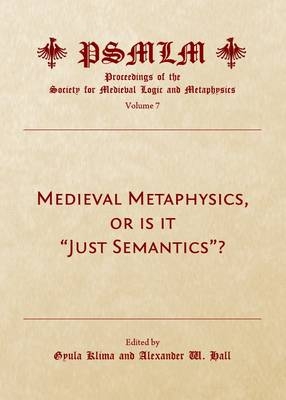
Medieval Metaphysics, or is it "Just Semantics"? (Volume 7
Proceedings of the Society for Medieval Logic and Metaphysics)
Seiten
2011
|
Unabridged edition
Cambridge Scholars Publishing (Verlag)
978-1-4438-3375-2 (ISBN)
Cambridge Scholars Publishing (Verlag)
978-1-4438-3375-2 (ISBN)
Medieval semantic theories develop out of Aristotle’s On Interpretation, in which he notes that “Spoken sounds are symbols of affections in the soul, and written marks symbols of spoken sounds” (tr. J. L. Ackrill, OUP 1984). The medieval commentary tradition elaborates on Aristotle’s theory in light of various epistemological and metaphysical commitments, including those entailed by the doctrine of the transcendentals that emerges from the tradition in the writings of Philip the Chancellor (d. 1236). Transcendental attributes such as unity, truth and goodness (properties that figure into most if not all accounts of the transcendentals) characterize every being as such, and hence the doctrine of the transcendentals promised some knowledge of God. This hope, together with the general medieval consensus that the cognitive acts by which we grasp extra-mental entities are veridical (i.e., in most cases, these acts represent what the cognizing subject takes them to represent) encouraged medieval thinkers to devote considerable effort to discerning how concepts latch onto reality. Medieval Metaphysics, or Is It “Just Semantics”? follows these attempts as concerns the signification of theological discourse in general and Trinitarian semantics in particular, the proper object of the intellect, and what is signified through quidditative or essential definition.
Gyula Klima is Professor of Philosophy at Fordham University, New York, USA; Doctor of the Hungarian Academy of Sciences; Founding Member and Director of the Society for Medieval Logic and Metaphysics, and Editor of its Proceedings. Professor Klima’s most recent book is John Buridan in OUP’s Great Medieval Thinkers series.Alexander W. Hall is Associate Professor of Philosophy at Clayton State University, Georgia, USA; Assistant Director of the Society for Medieval Logic and Metaphysics, and Managing Editor of its Proceedings. Hall’s recent scholarship includes Natural Theology in the Middle Ages in the Oxford Handbook of Natural Theology (OUP, 2012).
| Erscheint lt. Verlag | 23.12.2011 |
|---|---|
| Reihe/Serie | Proceedings of the Society for Medieval Logic and Metaphysics |
| Verlagsort | Newcastle upon Tyne |
| Sprache | englisch |
| Maße | 148 x 212 mm |
| Themenwelt | Geisteswissenschaften ► Philosophie ► Metaphysik / Ontologie |
| Geisteswissenschaften ► Philosophie ► Philosophie des Mittelalters | |
| ISBN-10 | 1-4438-3375-4 / 1443833754 |
| ISBN-13 | 978-1-4438-3375-2 / 9781443833752 |
| Zustand | Neuware |
| Haben Sie eine Frage zum Produkt? |
Mehr entdecken
aus dem Bereich
aus dem Bereich
Buch | Hardcover (2024)
Matthes & Seitz (Verlag)
CHF 41,90
Über konstruktivistisches Denken in der Theologie
Buch | Softcover (2024)
Verlag Herder
CHF 79,95


